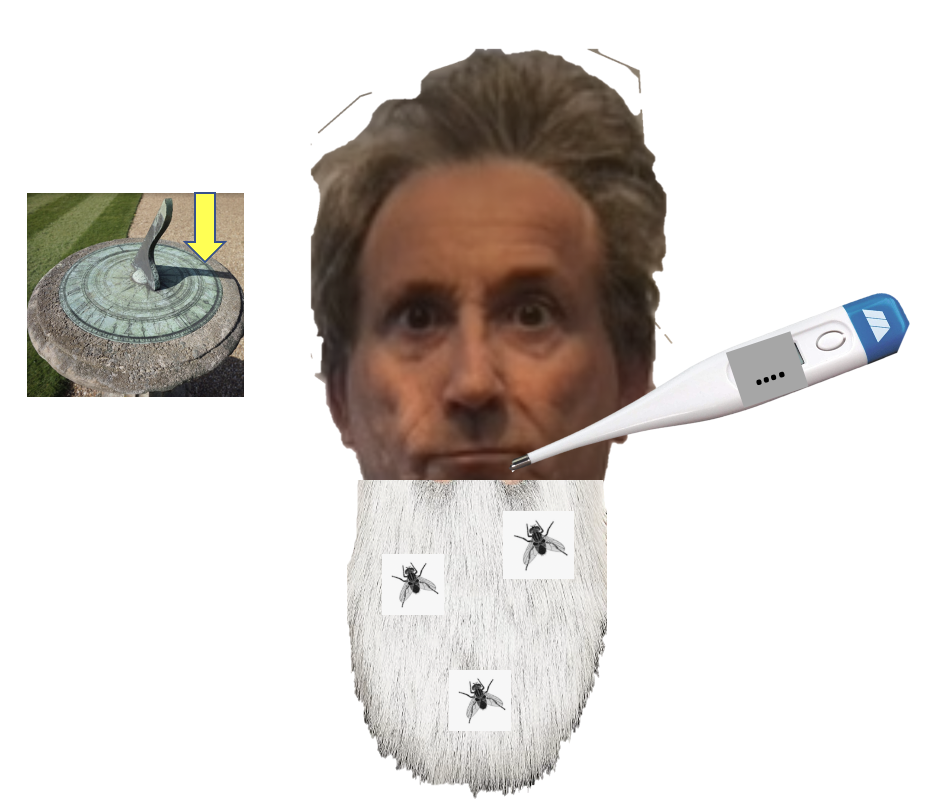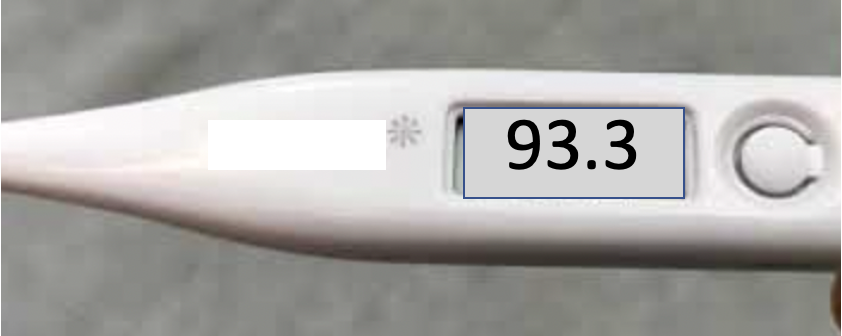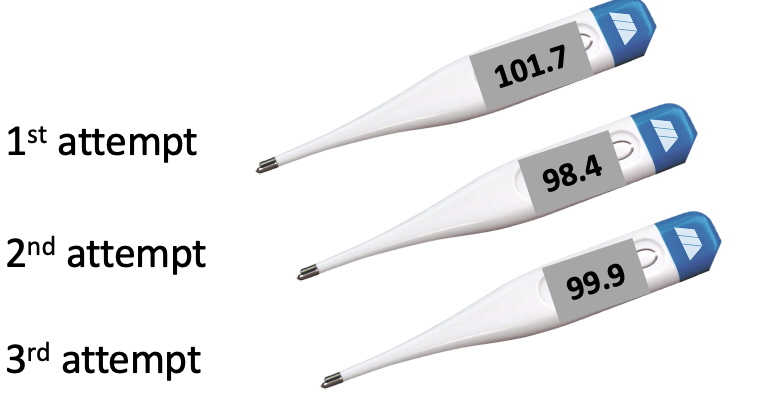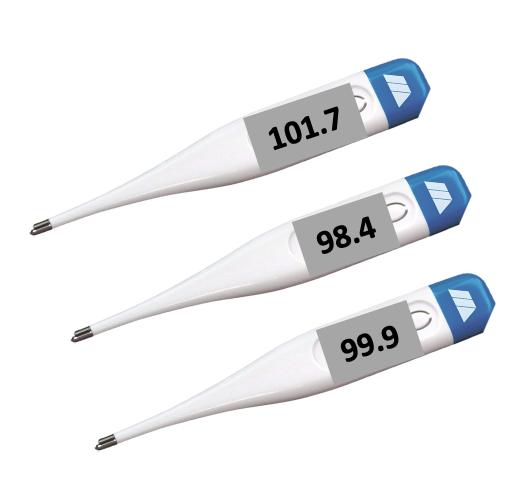So, after dodging it for nearly three years (and precisely 14 days post-omicron booster), the little SOB finally got me. Pretty crappy timing if you ask me. Rather than bitch and moan about how lousy I feel (plenty), I found something else to bitch and moan about: Digital thermometers. I hate them on the molecular level because, in my limited experience, they work properly about 0% of the time. And what could be a better opportunity for generating a superior dataset than neurotically checking my temperature every 17 seconds?
But it did not go well. I experienced thermomageddon at the worst possible time. Not one, not two, but three wretched digital thermometers failed miserably! (And good luck trying to buy a plain old liquid thermometer at CVS. You'll have a better chance of finding bagpipes in the makeup aisle.)
That said, let's get the rant out of the way first. Then you'll learn a little about gallium and how it has replaced mercury in "analog" thermometers.
Let the rant begin...
Thermometer #1 - "The Beepless Bomb"
This piece of junk was supposed to beep when it reached my temperature.

Image credit: Amazon, Wikimedia Commons
It did not.
Is it possible I didn't leave it in my mouth long enough?
...
...
No.

Thermometer #1 was promptly dispatched to the solid waste stream. I don't miss it.
Thermometer #2 - "The Death Sentence"
This stupid thing actually did beep and did so rather quickly. The problem?

According to the thermometer, I was clinically dead. This happens when your core body temperature goes below 95oF Sort of like this...

Winter is coming. Image credit: Lorie Shaull, Flickr
Thermometer #3 - "The Roulette Wheel"
Fortunately, (?) we had a third digital thermometer. Did this help? Not really. This one did beep and did give "non-death" readings but still failed to meet even the most meager criteria for an instrument that is supposed to provide an accurate and precise measure of your body temperature. (Quiz: do you know the difference between the two? Leave your answer in the Comments section). I sure didn't like the first reading. So I tried again. And again. And again.

The "Roulette Wheel." Is one supposed to average the numbers?
Either I got a whole lot healthier in the 45-second interval between the first two readings (and then sicker again during the next), or something ain't right. Into the trash. At this point, I'd had more than enough walking around with high-tech garbage hanging out of my mouth, so it was time for low-tech.
Time for some science, such as it is.
Whatever happened to good ol' mercury thermometers?
The first mercury thermometer was invented in 1748 and had provided accurate (and precise) temperatures for 250 years. There's even a study showing that they are more accurate than the stupid digital ones. [My emphasis]
A primarily clinical trial has been undertaken to investigate and compare the use of mercury and digital thermometers in a ward situation. Both laboratory and clinical studies show that there is no significant difference in the average accuracy of the two types of thermometers, however there is a greater fluctuation of readings of temperature when using electronic thermometers. In clinical studies between 9 and 23% of repeated measurements using an electronic thermometer differ by 0.5 degrees C or more whilst the corresponding range for mercury thermometers is 0.6%.
Davies, et. al., Journal of Advanced Nursing, 1986 Sep;11(5):535-43.
doi: 10.1111/j.1365-2648.1986.tb01285.x.DOI: 10.1111/j.1365-2648.1986.tb01285.x
But mercury hysteria took hold, and beginning in 2001, several states began to ban the things for pretty much no good reason. Yes, I know that mercury is a neurotoxin, but elemental mercury is not especially toxic when swallowed since less than 0.01% of it is absorbed, the rest passes through the intestinal tract. In the 19th century, some doctors took advantage of this property and used it as a laxative. This lack of toxicity does not hold true for elemental mercury vapor (absorbed by the lungs, very toxic), inorganic mercury salts (neurotoxins), or organomercury compounds (the worst of the worst). See Two Drops Of Death: Dimethylmercury).
OK, rightly or wrongly, you can't buy mercury thermometers anymore, but you're not stuck with the digital demons either. Another metal, gallium, stepped up to the plate. Gallium is the second lowest melting metal (1) – 30oC (86oF), so low that it will melt in your hand. The problem with using it as a mercury substitute is that neither your medicine cabinet nor the drug store is that warm, so the gallium in the thermometer would solidify – a big no-no. (See Gallium: Melts In Your Mouth, Not Your Hands!)
Fortunately, a little alloy chemistry took care of this problem. An alloy of gallium (69%), indium (22%), and tin (10%), which goes by the rather unimaginative name Galinstan, melts at -19oC (-2oF). The alloy looks and acts like mercury without its toxic baggage.
The results are in...
Amazon really stepped up here. About 30 minutes after I ordered one, the driver appeared, unwrapped the package, and stuck the thermometer in my... mouth: 98.6. (2,3)
Except I still feel like 10 pounds of horse manure stuffed into a 5-pound bag—damn virus. But at least it gave me something to complain about. As if that's normally a problem. Ask my wife.
NOTES:
(1) Technically, this is not true. Both cesium and francium have slightly lower melting points. But I omitted them because cesium will not only melt in your hand but also melt your hand. And francium is incredibly rare and highly radioactive, decaying with a half-life of 22 minutes. No one has ever seen even a drop of it. Obviously, mercury has the lowest melting point of all metals.
(2) OK, that's a bit hyperbolic, but the thing arrived about 12 hours later but I had to put it in my own mouth. I guess you need to be a Prime member for unwrapping and mouth-stuffing services.
(3) If you're old like me, you may remember when mercury thermometers were shoved... elsewhere. It's not really such a dignified procedure.




